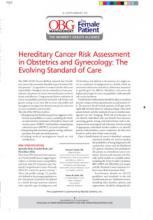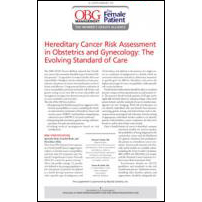User login
The 2009 ACOG Practice Bulletin reported that “hereditary cancer risk assessment should be a part of routine Ob/Gyn practice.”1 As specialists in women’s health, this is our responsibility. Though it may be unfamiliar to many practitioners, the process of cancer risk stratification can be efficient and effective. Using protocol-driven evaluation of cancer susceptibility, personal and family risk factors, and genetic testing, we are now able to create risk profiles and management strategies that demonstrate proven reduction in cancer morbidity and mortality.
The 2009 ACOG Practice Bulletin reported that “hereditary cancer risk assessment should be a part of routine Ob/Gyn practice.”1 As specialists in women’s health, this is our responsibility. Though it may be unfamiliar to many practitioners, the process of cancer risk stratification can be efficient and effective. Using protocol-driven evaluation of cancer susceptibility, personal and family risk factors, and genetic testing, we are now able to create risk profiles and management strategies that demonstrate proven reduction in cancer morbidity and mortality.
The 2009 ACOG Practice Bulletin reported that “hereditary cancer risk assessment should be a part of routine Ob/Gyn practice.”1 As specialists in women’s health, this is our responsibility. Though it may be unfamiliar to many practitioners, the process of cancer risk stratification can be efficient and effective. Using protocol-driven evaluation of cancer susceptibility, personal and family risk factors, and genetic testing, we are now able to create risk profiles and management strategies that demonstrate proven reduction in cancer morbidity and mortality.

